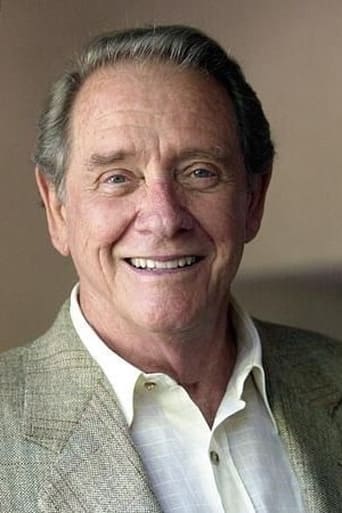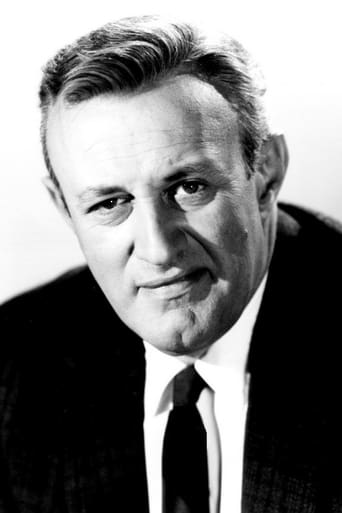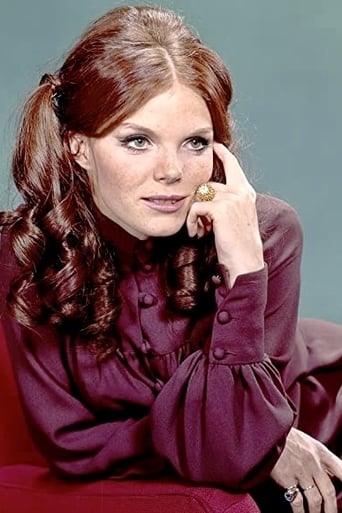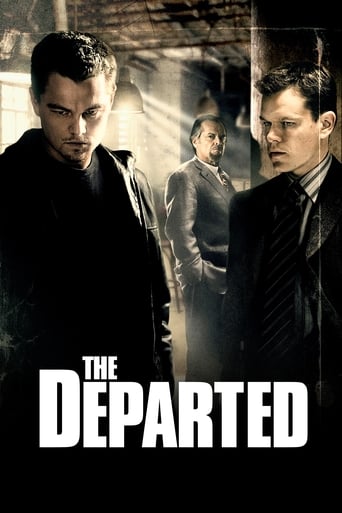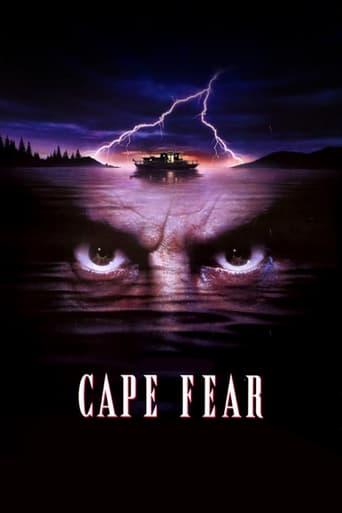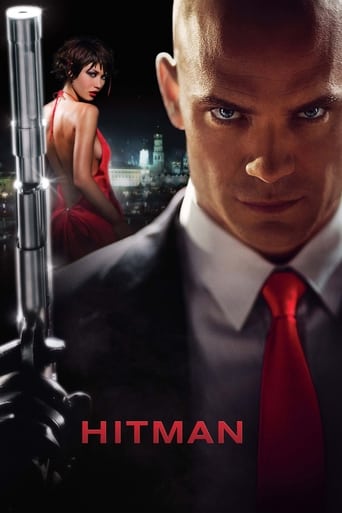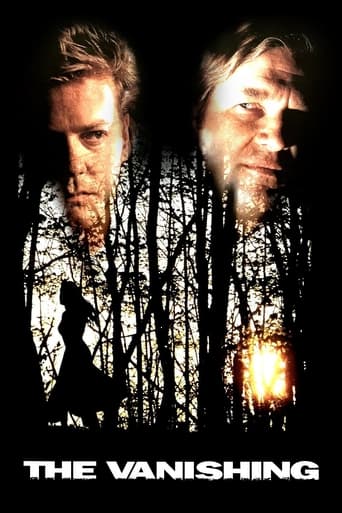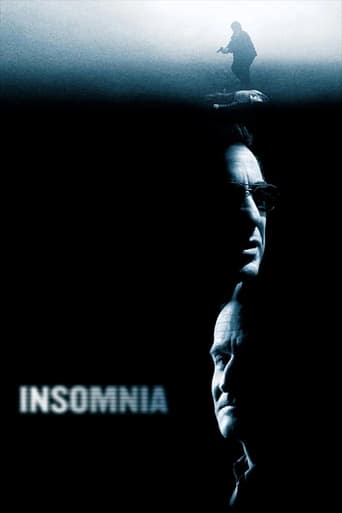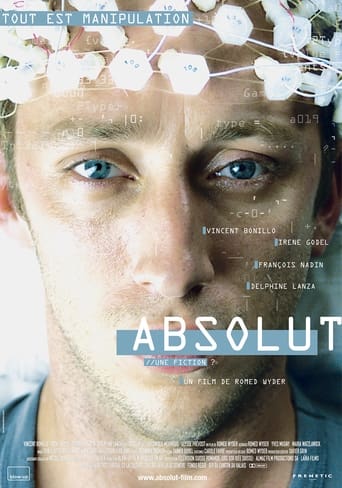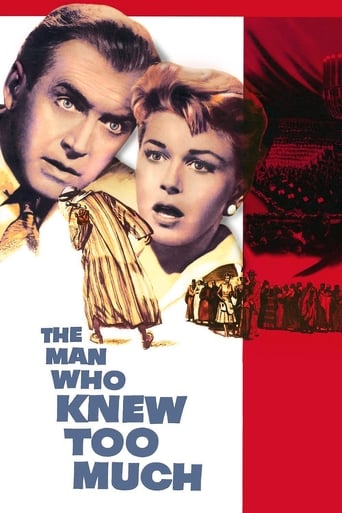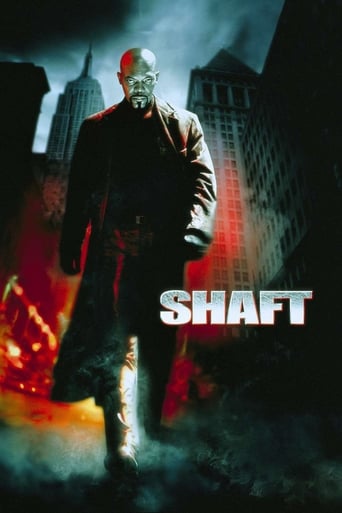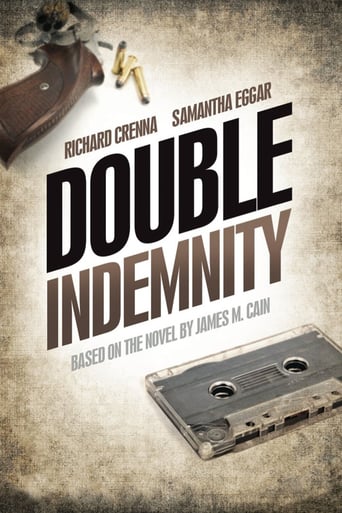

Double Indemnity (1973)
A scheming wife lures an insurance investigator into helping murder her husband and then declare it an accident. The investigator's boss, not knowing his man is involved in it, suspects murder and sets out to prove it.
Watch Trailer
Cast


Similar titles
Reviews
i must have seen a different film!!
Absolutely Fantastic
There are better movies of two hours length. I loved the actress'performance.
An old-fashioned movie made with new-fashioned finesse.
Los Angeles insurance salesman in his late 30s is seduced by the wife of one of his clients, who gives him the idea of taking out an accident insurance policy on her husband without his knowledge. If he's killed, the wife receives $200,000--if he's killed on a train, the amount is doubled. Writer Steven Bochco had the daunting task of compressing James M. Cain's crime novel into a 75-minute movie for television. Bochco must have known how unnecessary the whole idea was, especially since no amount of effort could even hope to get the project out from the shadow of Billy Wilder's classic 1944 version. The three leads (Richard Crenna and Samantha Eggar as the illicit lovers, Lee J. Cobb as Crenna's boss) go through the motions dutifully, but nothing here feels fresh.
Take Billy Wilder's amazing 1944 adaptation of Double Indemnity and then sap out all the blood. That's this 1973 made for television version.There's no style to anything. Gone are the claustrophobic sets and the sense of oppressive summer heat wave which gave atmosphere to the original. None of the sets seem designed to do anything other than give the boring, charisma-less actors space to march around in. None of the players are even close to the performances of the original. It's a hard chore to even equal, let alone top, the likes of Barbara Stanwyck or Edward G. Robinson. These people don't even come close.The cinematography is bland. No sexual tension. The dialogue is the same but when it's delivered with no verve it barely simmers. The climax is not so much built to as it is stumbled upon by bloodless characters.Ignore this. Not worth your time. Not worth the film it was shot on at all.
When Samantha Eggar (as Phyllis Dietrickson) answers the door of her house swathed in a towel, you realize that as competent an actress as Eggar may be, she doesn't have the hypnotic allure of Barbara Stanwyck. And it is not entirely Eggar's fault. In the original film, Wilder had Stanwyck not only appear in a towel, but she enters the scene on the second floor balcony of the house. And she doesn't "come out"; she appears, almost as if by magic. Walter Neff is staring up at her from below on the first floor. There is a reason for this. Stanwyck is much higher than Neff (Fred MacMurray) when they are first introduced. It is not just the towel. The towel adds to the seductive allure. Her pose is like a Greek Goddess overlooking her domain, and, in a strange way, you feel as if, from the start, she is actually controlling the entire situation. She has sexual, even magic, power. This person is no ordinary housewife. This person is a mystery with secrets hidden within.Back to 1973. The remake has Crenna knock on the front door. Stanwyck's stand-in, Eggar, answers the door with a towel around her. There is no "appearance". She simply opens the door. The alluring superiority that grabs the audience at the first appearance of Stanwyck in 1944 is entirely absent in 1973. She opens the door with a towel around her. It may be sexy in a Charlie's Angels sort of way, but it's not nearly as mysterious. The filmmakers of the remake seem to misunderstand Wilder's point. The script may have said "Phyllis appears in towel" so the filmmakers of the remake simply follow the instructions and include the required towel. The point is not the towel. The point is the enigmatic quality of Phyllis, and the potential power she wields. Wilder gave her a towel to add to her mystique. The filmmakers of the remake gave her a towel because that's what Wilder did. And in the choice of shot, lost all of Phyllis' mystique.Richard Crenna also seems miscast. He seems like he's "acting" and not really in the midst of the dilemma. Part of the problem is Crenna appears so much like a 70's actor. He can't get into the 1940's. When MacMurray first speaks into the microphone, sweat begins to drip from his face. No sweat on Crenna. And they also changed one of the crucial lines at the beginning. In the original, Neff says, "I didn't get the money, and I didn't get the woman." In the 1973 version, Crenna says, "I didn't get the money, and I didn't want the woman." Did the filmmakers completely misunderstand the entire point of the story? Or were they dumbing it down for a "television" audience?This made-for-TV movie is a by-the-numbers rendition. All the sharp edge of the original is lost. The only stand-out, maybe, is Lee J. Cobb in the role made famous by Edward G. Robinson. But he cannot save the loss of intensity of the original. This 1973 boring remake is a forgettable TV-movie made probably by the same people who did "Gilligan's Island". They might as well have tried to remake "Citizen Kane" or "Gone with the Wind". If mediocrity is the best one can hope for, what's the point? The 1944 classic is a Film with a capital "F". This made-for-TV remake deserves an "F" grade, or, maybe a "D" for dumb.
This 1973 remake of the classic 1944 Billy Wilder film, "Double Indemnity," is a textbook example of how to destroy a great script. This grade-B TV fodder also illustrates the folly of remakes in general. While Hollywood has gone after greedy executives that colorize black-and-white films and sought disclaimers on wide-screen movies that are shown in pan-and-scan versions, the industry has ignored the hacks that insist on taking a classic film and diminishing it with a shoddy remake.The first step in producing a bowdlerized version of a classic is to edit the script. The Billy-Wilder-Raymond-Chandler work was cut by a half hour to fit the finished film into a specified time-slot with room for commercials. Then update the production with bland, color photography, smart, upscale sets, and TV-familiar actors. Thus, the brand-new "Double Indemnity" eliminates the atmospheric black-and-white film-noir cinematography that enhanced the mood and characterizations of the original. Gone are the dusty, shadowy, claustrophobic sets that explained the protagonists' desires to escape their situations at whatever cost. Gone are the close bond between Keyes and Neff and the erotic attraction between Neff and Phyllis.The look of Jack Smight's take on "Double Indemnity" is more "Dynasty" than film noir. Phyllis Dietrickson has a designer home to die for, and Neff's comfy pad would be hard to afford on an insurance salesman's salary, not to mention the sporty Mercedes convertible that he drives. Neither character has any apparent motive to murder for a paltry $200,000. If not money, then perhaps murder for love or lust? Not in this version. Richard Crenna shows little interest in Samantha Eggar, and their kisses are about as lusty as those between a brother and a sister. Crenna fails to capture the cynicism of Neff, and his attempts at double-entendre and sexual suggestiveness fall horribly flat. Eggar is little better and lacks sensuality and the depth to suggest the inner workings of a supposedly devious and manipulative mind. Only Lee J. Cobb manages a creditable performance as Keyes. Director Jack Smight and his three principals have all done much better work.There was no conceivable reason to produce this wretched remake except to fill time in a broadcast schedule. There was no conceivable reason to resurrect this dud on DVD and package it with the original film except to fill out a double-disc package. The only lesson that can be learned from this misfire is that even a great script and great dialog can be ruined with poor casting, lackluster direction, and TV grade production values. The 1973 "Double Indemnity" should be titled "10% Indemnity," because viewing it only underscores the 100% perfection of the original movie.


